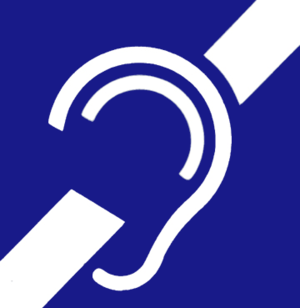Hearing disorders
| Hearing loss | |
|---|---|
| Synonyms | hard of hearing; anakusis or anacusis is total deafness |
 |
|
| The international symbol of deafness and hearing loss | |
| Classification and external resources | |
| Specialty | otorhinolaryngology, audiology |
| ICD-10 | H90–H91 |
| ICD-9-CM | 389 |
| DiseasesDB | 19942 |
| MedlinePlus | 003044 |
| eMedicine | article/994159 |
| MeSH | D034381 |
Hearing loss, also known as hearing impairment, is a partial or total inability to hear. A deaf person has little to no hearing. Hearing loss may occur in one or both ears. In children hearing problems can affect the ability to learn spoken language and in adults it can cause work related difficulties. In some people, particularly older people, hearing loss can result in loneliness. Hearing loss can be temporary or permanent.
Hearing loss may be caused by a number of factors, including: genetics, ageing, exposure to noise, some infections, birth complications, trauma to the ear, and certain medications or toxins. A common condition that results in hearing loss is chronic ear infections. Certain infections during pregnancy such as syphilis and rubella may also cause hearing loss. Hearing loss is diagnosed when hearing testing finds that a person is unable to hear 25 decibels in at least one ear. Testing for poor hearing is recommended for all newborns. Hearing loss can be categorised as mild, moderate, moderate-severe, severe, or profound. There are three main types of hearing loss, conductive hearing loss, sensorineural hearing loss, and mixed hearing loss.
Half of hearing loss is preventable. This includes by immunization, proper care around pregnancy, avoiding loud noise, and avoiding certain medications. The World Health Organization recommends that young people limit the use of personal audio players to an hour a day in an effort to limit exposure to noise. Early identification and support are particularly important in children. For many hearing aids, sign language, cochlear implants and subtitles are useful. Lip reading is another useful skill some develop. Access to hearing aids, however, is limited in many areas of the world.
...
Wikipedia
